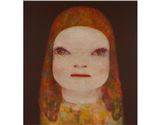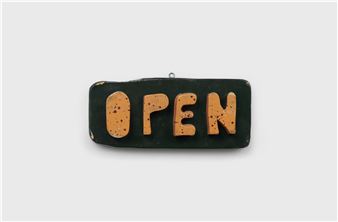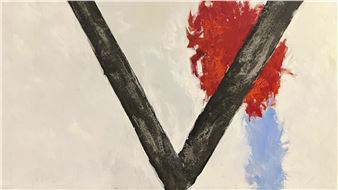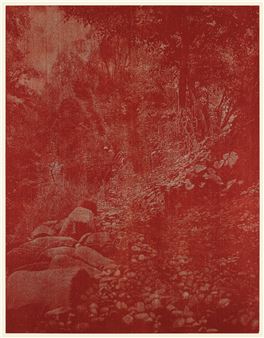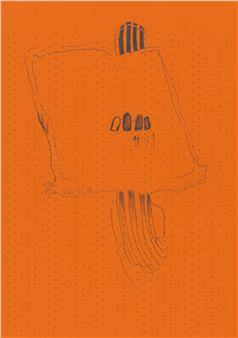Ficciones PatГіgenas
вҖңPossessed.вҖқ вҖңDeviant.вҖқ вҖңSick.вҖқ Historically, colonial regimes attempted, gained, and maintained control over cuir/kuir/queer, trans, Black, and Indigenous people by pathologizing them along with their relationshipsвҖ”to the land, to the nonhuman, to one another. The rich sexual and gender diversity of the many cultures of Abya Yala (Kuna for the entirety of the Americas) was unintelligible to Western knowledge frameworks. To justify acts of violent dispossession and extraction, they characterized specific ways of existing as unnatural. These narratives have wound through legal, religious, cultural, political, and ideological structures in Abya Yala since 1492, andвҖ”as ficciones patГіgenas (pathogenic fictions)вҖ”they shape our understandings of bodies, land, culture, and power today.
The artists in this exhibition explore how ficciones patГіgenas have been perpetuated and embodied, occluding local, non-Western, and Indigenous ways of being and knowing. In their 2018 book, ficciones patГіgenas, Guaxu trans writer, activist, and participating artist Duen Neka'hen Sacchi traces their own medical history through Western regimes of bodily conformity. The wounding and suturing of NekaвҖҷhenвҖҷs body (and other nonconforming bodies), based on false notions of order and reproduction, echoes the violent reshaping of the вҖңIndies,вҖқ which inextricably bound biology to nationhood. Through hybrid practices that draw from Indigenous, colonial, and contemporary images and strategies, the artists propose ways in which land and bodies exist as sites of resistance and transformation.
This exhibition is part of Dispossessions in the Americas: The Extraction of Bodies, Land, and Heritage from la Conquista to the Present, a project of the Mellon FoundationвҖҷs Just Futures Initiative. Over the past three years, in eleven countries across the Americas, the project has sponsored exhibitions documenting over 500 years of territorial, embodied, and cultural heritage dispossession through mechanisms of deceit, disease, and warfare. The exhibitions have featured contemporary artworks that address indigeneity, extractivism, coloniality, racism, and gender and sexual dissidence. The organizers of ficciones patГіgenas, Stamatina Gregory and Georgie SГЎnchez, bring together only a small selection of the artists and artworks presented across this multitude of international exhibitions.

Recommended for you
вҖңPossessed.вҖқ вҖңDeviant.вҖқ вҖңSick.вҖқ Historically, colonial regimes attempted, gained, and maintained control over cuir/kuir/queer, trans, Black, and Indigenous people by pathologizing them along with their relationshipsвҖ”to the land, to the nonhuman, to one another. The rich sexual and gender diversity of the many cultures of Abya Yala (Kuna for the entirety of the Americas) was unintelligible to Western knowledge frameworks. To justify acts of violent dispossession and extraction, they characterized specific ways of existing as unnatural. These narratives have wound through legal, religious, cultural, political, and ideological structures in Abya Yala since 1492, andвҖ”as ficciones patГіgenas (pathogenic fictions)вҖ”they shape our understandings of bodies, land, culture, and power today.
The artists in this exhibition explore how ficciones patГіgenas have been perpetuated and embodied, occluding local, non-Western, and Indigenous ways of being and knowing. In their 2018 book, ficciones patГіgenas, Guaxu trans writer, activist, and participating artist Duen Neka'hen Sacchi traces their own medical history through Western regimes of bodily conformity. The wounding and suturing of NekaвҖҷhenвҖҷs body (and other nonconforming bodies), based on false notions of order and reproduction, echoes the violent reshaping of the вҖңIndies,вҖқ which inextricably bound biology to nationhood. Through hybrid practices that draw from Indigenous, colonial, and contemporary images and strategies, the artists propose ways in which land and bodies exist as sites of resistance and transformation.
This exhibition is part of Dispossessions in the Americas: The Extraction of Bodies, Land, and Heritage from la Conquista to the Present, a project of the Mellon FoundationвҖҷs Just Futures Initiative. Over the past three years, in eleven countries across the Americas, the project has sponsored exhibitions documenting over 500 years of territorial, embodied, and cultural heritage dispossession through mechanisms of deceit, disease, and warfare. The exhibitions have featured contemporary artworks that address indigeneity, extractivism, coloniality, racism, and gender and sexual dissidence. The organizers of ficciones patГіgenas, Stamatina Gregory and Georgie SГЎnchez, bring together only a small selection of the artists and artworks presented across this multitude of international exhibitions.
Contact details

Related articles
In the early morning of June 28, 1969, the New York Police Department raided the Stonewall Inn, a gay bar in Lower Manhattan.

 ARTISTS
ARTISTS



